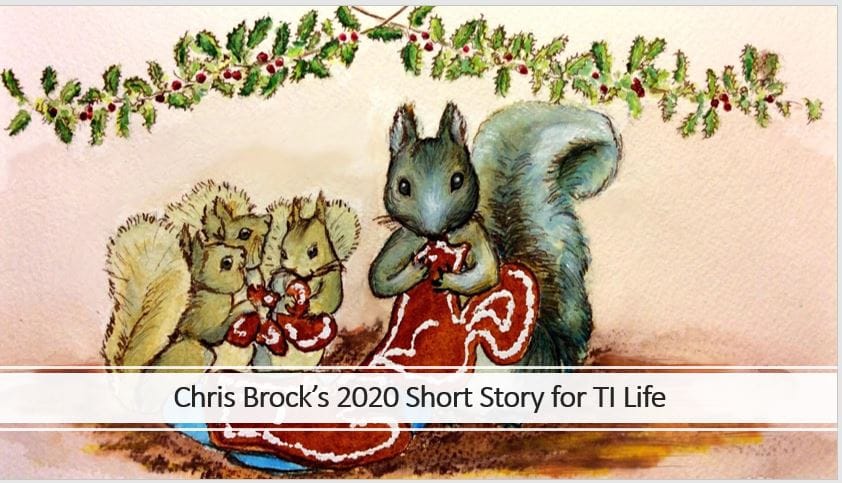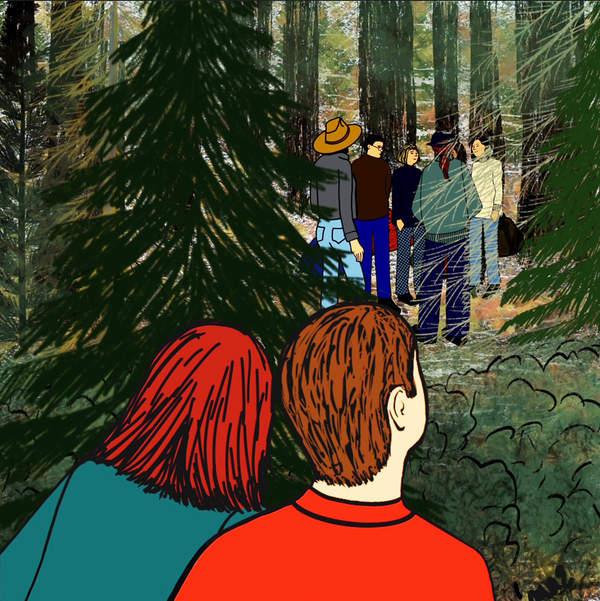Season’s Eatings, From Maple Street, by Chris Brock
by: Chris Brock
Carl and Gail Gunther had just completed their fourth batch of Christmas cookies in a whirlwind of their usual holiday kitchen madness. This particular cookie batch of festive reindeers was quite elaborate, involving chocolate dough rolled in coconut flakes for legs, gingerbread with Peruvian cinnamon for the bodies, homemade candies for the eyes and expertly shaped pretzels for the antlers.
Flour and dough covered the kitchen floor and the kitchen sink contained so many pots and pans that it all resembled something left behind at a decaying hazardous waste site that nobody wanted to touch without a government grant.

After pulling the last tray of cookies from the oven, the Gunthers retreated from the kitchen to the sanctuary of their couch and collapsed into the coolness of its leather confines.
“Well,” Carl said. “That’s it for the reindeer cookies.”
“Next is the Christmas biscuits,” Gail reminded him.
“And then the holiday cakes!” Carl said with enthusiasm.
The couple had not always embarked on such a blizzard of holiday baking. It began when their eldest child moved out of their house located in the Lake Ontario village of Brackets Harbor to an out-of-state job, leaving the empty-nest Gunthers despondent at holiday time. To fill the gaps they felt at home, especially at holidays, they decided to bake.
With wild mania, they collected and devoured recipes for Christmas cookies, breads, candy and all things related from cookbooks, web sites and the local newspaper. At first, they weren’t too good at baking and their rejected results were tossed out their back door to feed various neighborhood critters, who occasionally still came around hoping once again for an unfortunate turn of events in the kitchen.
But that hadn’t happened in years. The Gunthers developed quite the baking reputation. At first, and quite unwisely, they consumed much of what they made. But as they saw their weight increase, they realized a solution was just outside their doors. Their Maple Street neighbors could act like a sort of pressure valve for their baking, relieving the couple of the excess calories they would have put on if they consumed all the treats themselves. It also acted as a conduit for their baking creativity, offering wild encouragement.
So for the past several years, starting the day after Thanksgiving, they had unloaded tons of homemade holiday baked treats onto neighbors. If the neighbors didn’t like the largess, they never said anything, not even refusing an experimental fruitcake. Maybe the neighbors were too polite, or they obeyed the unwritten code of Christmas cheer of never refusing a baked holiday gift.
Regardless, the lack of negative comments empowered the Gunthers. And slowly, the neighbors succumbed and surrendered to the tradition, as they saw one or both of the Gunthers stroll up to their doorsteps bearing baked goods about a dozen times each Christmas season. The general consensus that spread in the neighborhood became: “Why are we wasting time during the holidays baking when we have such wonderful neighbors?”
Resistance was futile and the neighbors, tamed of their holiday baking desires, were amazed how much time they were freeing up when they simply stopped baking and left such seasonal tasks to the Gunthers. They spent more time doing such holiday-related things as decorating their homes, volunteering for the Salvation Army and, depending on the disposition of the family, hosting wine tastings or beer blasts.
To allay any sense of guilt, neighbors often provided the Gunthers with 50-pound bags of flour and sugar and told them to have at it.
If neighbors weren’t home when things emerged from the Gunthers’ oven, the couple left their baked creations on porches, between doors, in mail boxes, in trees and bushes along porches, and inside unlocked vehicles. They were scrumptious treasures for the neighbors, who came home and discovered the treats with glee.
So as the Gunthers sat on their couch after their last rush of cookies, they paused to take a breath before planning their next assault on the neighborhood. Boxes of treats already made were piled in the kitchen ready for their neighborhood delivery the next day.
They were about to order a pizza when their doorbell rang.
At the door was Mr. Whitmore, who was carrying something in his arms.
“Hello neighbors,” he said softly, nearly apologetically. “My wife made this.”
The Gunthers stared in shock at the item that Mr. Whitmore held out, slowly at first, as if he regretted it. The Gunthers locked eyes, both aghast at the gall of this neighbor. In his hands was some sort of a baked holiday item, with candied fruit that appeared to be haphazardly glued on top of it as an afterthought.
Certainly, Mr. Whitmore must have known that he had entered the headquarters of the distributor of neighborhood holiday treats; a situation which for years was the topic of several feature stories in local media? They wondered: Was he here to mock them?
The Gunthers knew the Whitmores, but only slightly. Mr. Whitmore had some sort of city job, with the water department or something. Mrs. Whitmore could be seen out in her flower garden sometime, and that was about it.
‘Well, this is totally unexpected,” Gail told Mr. Whitmore. The sarcastic emphasis she placed on “unexpected” seemed to sail over the treat-bearer’s head.
To retaliate on the spot, the Gunthers didn’t invite Mr. Whitmore inside, which he seemed to expect as he peaked around the door frame. With pretend gratitude, the Gunthers accepted the gift. On closer inspection, below the candied fruit was a ringed cinnamon roll creation.
“Imagine that!” Gail said after she shut the door and Mr. Whitmore retreated down the sidewalk. “How many times have we brought stuff over to those Whitmores – and I’m just counting this year. The gall of Susan Whitmore to think we needed something. I tell you, this cinnamon roll thing is filled with evil intent!”
“I heard from Jim Riley on our last cookie delivery that Mrs. Whitmore was considering baking something for the holidays,” Carl said. “She wanted to get into the spirit. Jim laughingly dismissed it and I thought it was so far out there that I didn’t bother to mention it to you.”
“Then she should keep it at home if she has that need,” Gail said. “I bet she’s just doing it to spite us.”
She partially unwrapped the red Christmas ribbon and clear plastic wrap from the baked item.
“And look at that thing,” she said. “It’s haphazard, and lopsided -- like it tried to escape from the pan on a slow crawl, but she stopped it with a hammer. It’s not something to put me into the Christmas spirit! Halloween, maybe.”
“It probably tastes just as bad,” Carl said.
“No doubt,” Gail said. “Let’s see how bad it is.”
They brought out a knife, sliced off a few slivers and tasted.
It was delicious.
“Hmmm... it needs a bit of work, but this is pretty good,” Carl said as he sliced off another section.
“It has potential,” Gail said, chewing and tasting her slice to the end, hoping against hope that it would suddenly leave a bad taste or even make her keel over. It did neither.
But she couldn’t go for another piece.
“We have morals, husband,” she said. “We can’t eat this. We’d be traitors.”
Carl put the wrapping back on the item.
“Yeah,” he said. “It’s not like we don’t have other stuff to eat around here. And if something like this spreads, what would it mean for our reputation?”
They also realized they couldn’t pawn it off on the neighbors as their own. Not only were pieces missing, but who knew how many such cinnamon roll creations made by the Whitmores were making their way through the neighborhood?
The couple also didn’t like to waste food. So they did the only logical thing. They reverted to old practices and tossed the cinnamon roll out their back door and onto the snow. As designed, the cinnamon roll impressively rolled for quite a bit before coming to rest along the base of a black walnut tree.
The next morning, Mrs. Whitmore was enjoying her morning cup of coffee as she usually does by looking out her back window and watching the birds under her three bird feeders in her yard. It was then she saw the squirrel in distress.
It had some sort of string attached to it and something red was wrapped around it; a ribbon apparently, which impeded its walking. It managed to crawl closer to the house, as if pleading, and Mrs. Whitmore swore the critter looked into the window and at her with a “Help me!” expression. Its mouth was open and stuck to its teeth was what appeared to be a candied cherry. She then nearly dropped her mug when she realized the poor critter was trapped in a ribbon with which she so expertly wrapped up her cinnamon rolls. Mrs. Whitmore saw that attached to the ribbon entrapping the squirrel was a name tag that clearly said in her writing, “Happy holidays to the Gunthers.”
She called to her husband and requested that he help the squirrel’s predicament.
“I can’t catch a squirrel,” he said.
“I think you’ll be able to catch this one,” his wife said. “He looks sick and he’s tangled up. I bet those Gunthers tied the ribbon and name tag to it as some sort of sick message to me. This is Mafia-like tactics.”
Mr. Whitmore grabbed a pair of scissors and put on his boots. He approached the squirrel from behind. But the creature heard him coming and managed to limp away and up a small tree, but still out of reach.
“We can’t let it suffer,” Mrs. Whitmore said.
“I could try to trap it later,” her husband said. “I could use the trap we have for skunks.”
That gave his wife an idea. It was an idea fueled by the anger of someone who realized that not only had a holiday baked item from her was likely shunned, but the recipients had gotten an innocent squirrel involved in a sick plot for revenge.
Mrs. Whitmore realized the squirrel wasn’t done with making a statement.
It was easy to catch later that day in the trap that Mr. Whitmore set up, combined with his usual critter bait -- a mix of peanut butter and chewing tobacco. His wife told him she’d untangle the string from the squirrel and set him free.
“Fine. It’s all yours,” he said.
Mrs. Whitmore waited until she saw that the Gunthers had gone to bed, around midnight. On an unseasonably warm evening and while trying to avoid the glow of lights from neighborhood Christmas decorations, she crept over to their house, carrying the caged squirrel, which by this time had nicely revived through Mr. Whitmore’s concoction. She had planned to break a window or find another way in, but felt extremely lucky when she saw the window to the kitchen was slightly open as a sort of a vent. The aroma from the latest batch of Christmas goodies cooling on a counter drifted to the outside.
The window slit was just wide enough for her to place the cage on the window ledge and for the squirrel to joyfully climb through the opening and into the kitchen.
When Mr. Gunther got up at 2 a.m. to shut the window, the kitchen scene was one of disaster. Cookies and crumbs were scattered everywhere. Cakes had holes, or rather burrows, in them. A loaf of fruitcake was completely gone.
On the floor, with a strangely satisfied look frozen on its face, was a plump, apparently dead squirrel on its back -- arms and legs akimbo.
Mr. Gunther woke his wife with excitement as if he was a kid on Christmas morning.
“Look,” he said when his wife wearily trudged into the kitchen. “Even the animals have heard of our baking exploits. We’ve had an invasion!”
Mrs. Gunther walked into the kitchen, saw the disaster scene, grabbed an apron and immediately went into neighborly holiday baking mode.
“Well, get rid of the squirrel and fire up the oven,” she said. “We’ve got some batches to replace. And that dead critter reminds me. I saw a squirrel cookie mold at Target the other day. You should go get it. I’m thinking those Whitmores, to return a favor, might enjoy a nice batch of festive squirrel cookies.”
By Chris Brock
This is Chris Brock's seventh fiction piece for TI Life. Chris is the features writer and a copy editor at the “Watertown Daily Times” and on the WDT's NNY360.com where he has won several writing awards. Writing humorous short stories is a hobby. He grew up on the St. Lawrence River community of Waddington, N.Y. His "Those Carp People and Other Tales of Life Along the St. Lawrence" is his most amusing book and it is available on amazon.com. (Still a perfect Xmas Gift for a River Rat.) And Chris says, "He seeks a traditional publisher for stories published since that book's release." Click Here to see his other TI Life works.
Illustrations for "Season’s Eatings, From Maple Street," by Chris Brock are by Marie-Anne Erki ©2020, Kingston, ON.




